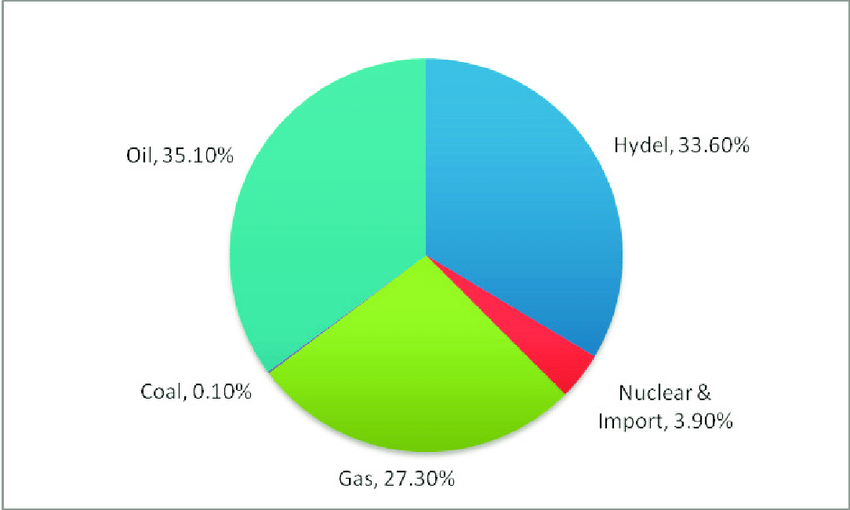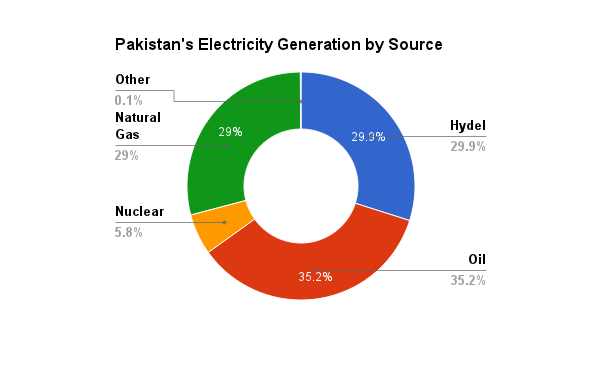Electricity generation is a cornerstone of economic growth and development in any country. In Pakistan, understanding what is the largest source of electricity generation in Pakistan is crucial for addressing the country's energy needs and planning for the future. While hydropower has traditionally been a dominant source, natural gas has emerged as a significant contributor to Pakistan's energy mix, playing a vital role in meeting the electricity demand.
Overview of Electricity Generation in Pakistan
Pakistan's electricity generation relies on a diverse mix of energy sources, including:
-
Natural Gas
-
Hydropower
-
Coal
-
Oil
-
Nuclear Energy
-
Renewable Energy (Solar and Wind)
Among these, natural gas is now one of the largest sources of electricity generation in Pakistan due to its cost-effectiveness and availability.

Understanding what is the largest source of electricity generation in Pakistan highlights the critical role of natural gas in the country's energy sector. While hydropower has traditionally been a dominant source, natural gas now powers a significant portion of Pakistan's electricity needs due to its cost-effectiveness and reliability. To ensure a stable energy future, Pakistan must address challenges like depleting reserves and outdated infrastructure while expanding renewable energy and modernizing its power sector. By leveraging its resources and adopting sustainable practices, Pakistan can achieve energy security and support its economic growth.
Natural Gas: A Leading Source of Electricity in Pakistan
Why is Natural Gas Important for Pakistan?
Natural gas plays a critical role in Pakistan's energy landscape for several reasons:
-
Domestic Availability: Pakistan has significant natural gas reserves, which have historically supported its energy sector.
-
Cost-Effectiveness: Natural gas is cheaper compared to imported fuels like oil, making it an economically viable option.
-
Cleaner Energy Source: It produces fewer greenhouse gas emissions compared to coal and oil, aligning with global environmental goals.
-
Versatility: Natural gas is used not only for electricity generation but also in industries and households.
Contribution of Natural Gas to Electricity Generation
Natural gas contributes a substantial share to Pakistan's electricity generation, powering various thermal plants across the country. Key statistics include:
-
Over 35% of electricity in Pakistan is generated using natural gas.
-
Major thermal power plants rely on natural gas for fuel, ensuring a steady supply of electricity.
Major Natural Gas Power Plants in Pakistan
Some of the prominent natural gas power plants include:
-
Guddu Thermal Power Plant: A major contributor to the national grid.
-
Bin Qasim Power Station: Located in Karachi, it uses natural gas as a primary fuel source.
-
Uch Power Plant: A combined-cycle plant utilizing natural gas efficiently.
Benefits of Natural Gas in Electricity Generation
-
Reliability: Natural gas provides a consistent and reliable source of energy.
-
Efficiency: Modern combined-cycle power plants maximize energy output from natural gas.
-
Environmental Benefits: Lower carbon emissions compared to coal and oil make it a cleaner option.
Hydropower: The Traditional Leader
While natural gas is a leading source, hydropower has traditionally been a dominant contributor to Pakistan's electricity generation. The country’s geographical features, including rivers and mountainous regions, make it ideal for hydropower projects.
Major Hydropower Projects
-
Tarbela Dam: One of the largest earth-filled dams in the world, with a capacity of 4,888 MW.
-
Mangla Dam: Located on the Jhelum River, with a capacity of 1,150 MW.
-
Neelum-Jhelum Hydropower Plant: With a capacity of 969 MW, it is a critical addition to Pakistan's energy infrastructure.
Advantages of Hydropower
-
Renewable and sustainable energy source.
-
Low operational costs after initial setup.
-
Reduces reliance on fossil fuels.
Other Sources of Electricity Generation
Coal
Pakistan has vast coal reserves, particularly in the Thar region. Coal-based power plants are being developed to diversify the energy mix.
Oil
Oil-based power plants are used during peak demand periods but are expensive and environmentally detrimental.
Nuclear Energy
Nuclear power contributes a smaller yet reliable portion of Pakistan's electricity supply. Key plants include:
-
KANUPP (Karachi Nuclear Power Plant)
-
Chashma Nuclear Power Plants (CHASNUPP-1 and CHASNUPP-2)
Renewable Energy
Solar and wind energy are gaining traction in Pakistan. Projects like the Jhimpir Wind Corridor and Quaid-e-Azam Solar Park highlight the potential of renewables.
Challenges in Electricity Generation
Despite its diverse energy mix, Pakistan faces several challenges:
-
Energy Deficit: The electricity demand often exceeds supply, leading to load-shedding.
-
Depleting Natural Gas Reserves: Domestic reserves are declining, increasing reliance on imported liquefied natural gas (LNG).
-
Outdated Infrastructure: Aging power plants and transmission lines need modernization.
-
Environmental Concerns: While natural gas is cleaner than coal, it still contributes to carbon emissions.
Government Initiatives and Future Plans
The government of Pakistan is taking steps to address these challenges and improve electricity generation:
-
LNG Imports: To counter declining domestic reserves, Pakistan is importing LNG to meet its natural gas needs.
-
Energy Diversification: Increasing the share of renewables and coal in the energy mix.
-
Infrastructure Development: Upgrading transmission lines and power plants to reduce losses.
-
CPEC Projects: Under the China-Pakistan Economic Corridor, several energy projects, including coal and hydropower plants, are being developed.

FAQs
What is the largest source of electricity generation in Pakistan?
The largest source of electricity generation in Pakistan is natural gas, which powers over 35% of the country's electricity needs.
Why is natural gas important for Pakistan?
Natural gas is cost-effective, domestically available, and cleaner than other fossil fuels, making it a vital part of Pakistan's energy mix.
What are the major natural gas power plants in Pakistan?
Prominent natural gas power plants include the Guddu Thermal Power Plant, Bin Qasim Power Station, and Uch Power Plant.
What challenges does Pakistan face in electricity generation?
Key challenges include energy deficits, depleting natural gas reserves, outdated infrastructure, and environmental concerns.
What is the role of renewable energy in Pakistan's energy mix?
Renewable energy sources like solar and wind are being developed to diversify the energy mix and reduce reliance on fossil fuels.





.gif)








.gif)







Sign in
to continue to ilmkidunya.com